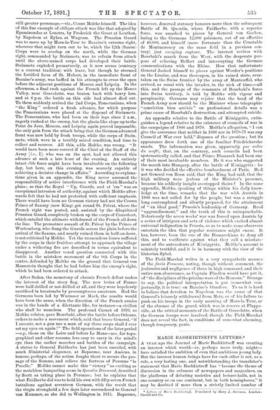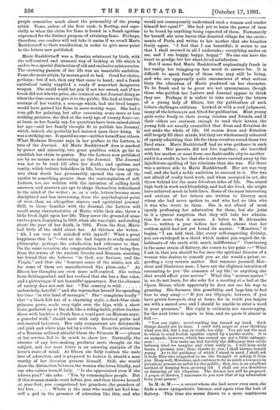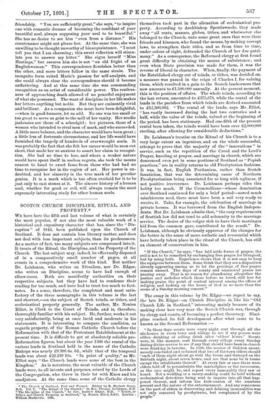MARIE BASHKIRTSEFF'S LETTERS.* A YEAR ago the Journal of Marie
Bashkirtseff was creating an interest which would—or, perhaps more truly, might— have satisfied the ambition of even that ambitious young lady. But the interest human beings have for each other is not, as a rule, a very lasting one, and notwithstanding the translator's= statement that Marie Bashkirtseff has " become the theme of discussion in the columns of newspapers and magazines, on the platforms of debating societies and lecture-halls, not in one. country or on one continent, but in both hemispheres," it may be doubted if more than a strictly limited number of
* Letters of Marie Bashkirtseff. Translated by Mary J. Serrano. London: Cassell and Co. people remember much about the personality of the young artist. Fame, unless of the first rank, is fleeting, and espe- cially so when the claim for fame is found in a frank egotism expressed for the distinct purpose of attaining fame. Perhaps, therefore, our readers will not take it amiss if we recall Marie Bashkirtseff to their recollection, in order to give more point to the letters now published.
Marie Bashkirtseff was a Russian aristocrat by birth, with the self-centred and unmoral way of looking at life which is said to be a special distinction of old and exclusive aristocracies. The crowning passion of her life was an insatiable ambition. Fame she must attain, by means good or bad. Good for choice, perhaps ; but if not, then any that came to hand ; and a frank egotistical vanity supplied a ready if somewhat dangerous weapon. She could wield her pen if not her sword, and if her brush did not win the prize, she counted on her Journal doing so when the time came to give it to the public. She had at least the courage of her vanity, a courage which, had she lived longer, would have gained her fame in more worthy ways. She had a true gift for painting, but after executing some more or less striking pictures, she died at the early age of twenty-four--or, at least, so her family say, for questions have been raised about her age—and her family thought fit to publish her Journal, which, indeed, she probably had insisted upon their doing. It was a striking one. It spared no one—neither herself nor others. What Madame Serrano says in her preface to the Letters, is true of the Journal. All Marie Bashkirtseff does is marked by power and sincerity, two great qualities which go far to establish her claim to genius. But the Letters now published are by no means so interesting as the Journal. The Journal was not to be read till after her death ; and egotism and vanity, which irritate beholders in life, become far less aggres- sive when death has presumably opened the eyes of the egotist to something greater than the contemplation of self. Letters, too, are written with the intention of calling forth answers, and answers are apt to shape themselves beforehand to the mind of the writer ; so, as a rule, letters become more disciplined and less interesting, from the psychological point of view, than an altogether sincere and egotistical journal. Still, to those familiar with the Journal, the Letters will recall many characteristics of Marie, while they also throw a little fresh light upon her life. They cover the ground of some twelve years, beginning in 1868, when she was eight, and ending about the year of her death, in 1884. From the first, Marie had little of the child about her. At thirteen she writes ; " Ah, I am very well satisfied with myself ! What a great happiness that is ! "—but as she had begun to study natural philosophy, perhaps the satisfaction had reference to that. On the same occasion, she congratulates herself on being free from the errors of the ancient Greeks and Romans, assuring her friend that she believes " in God, our Saviour, and the Virgin," and that she " honours some of the saints, not all, for some of them are manufactured like plum-cake." At fifteen her thoughts are even more self-centred. She writes from Schlangenbad, and has realised that she has a fine voice, and a picturesque if not beautiful appearance. But the absence
of society does not suit her. " The country is wild melancholy, hateful ! "and she reproaches herself for spending her time " in this land of sausages." She " complains loudly " that " a black-felt hat of a charming style, a dark-blue cloth princess gown, made very tight over the hips, with a short train gathered up at the side like a riding-habit, yellow-leather shoes with buckles, a fresh face, a regal port (as Mamma says), a graceful walk," should meet with only deserted paths and untenanted balconies. Her only companions are dairymaids and pink and white pigs led by a ribbon. Even the attentions of a Russian military attache whom the Princess M — places at her service, fail to do much to cheer her. Naturally, the absence of any love-making produces more thought on the subject, and her next letter is an amusing analysis of the lover's state of mind. At fifteen she fully realises the male love of adoration, and is prepared to bestow it, should a man worthy of her devotion present himself. Still, she would draw the distinction between the woman who loves blindly, and one who values herself duly. " Is she appreciated even if she adores you?" she asks. " Yes, by commonplace people. But if this woman stands erect before you, and then throws herself at your feet, you comprehend her grandeur, the grandeur of her love Where is the man who would not feel him- self a god in the presence of adoration like this, and who
would not consequently understand such a woman and render himself her equal?" She had yet to learn the power of men to be bored by anything being expected of them. Fortunately for herself, she soon leaves this deserted village for the excite- ments of Paris, and writes to her mother that she breathes
freely again. "I feel that I am beautiful ; it seems to me that I shall succeed in all I undertake ; everything smiles on me, and I am happy, happy, happy." No one can have the heart to grudge her her short-lived satisfaction.
Bnt if some find Marie Bashkirtseff nnpleasingly frank in her vanity, her bringing-up has much to answer for. It is difficult to speak freely of those who may still be living, and who are apparently quite unconscious of what serious blots the education of Marie produced on her character. To be frank and to be great are not synonymous, though those who publish her Letters and Journal appear to think they are. Perhaps it is unfair to take seriously the letters of a young lady of fifteen, but the publication of such letters challenges criticism. Looked at with a cool judgment, many of the letters are not fitted for publication. Most young girls write freely to their young cousins and friends, and if their elders are overseen enough to read their letters, the young folk are usually counselled that dress and flirtation do not make the whole of life. Of course dress and flirtation still largely fill their minds, but they are wholesomely ashamed of openly admitting that life for them revolves round those two fixed stars. Marie Bashkirtseff had no wise guidance in such matters. Her parents did not live together ; she travelled with her mother or aunt from one fashionable city to another and it is a credit to her that she is not more carried away by the injudicious spoiling of her relations than she was. For there was a serious side to Marie Bashkirtseff. Her art was very real, and she had a noble ambition to succeed in it. She was not afraid of really hard work, and when occupied in art, she threw behind her the more frivolous sides of life. She aimed high both in work and friendship, and had she lived, she might have achieved much in both lines. Some of the most interesting and curious of her letters are written to literary men whom she had never spoken to, and who had no idea who it was who wrote to them. She is not afraid of most openly professing her admiration for them, but she joins to it a cynical suspicion that they will take her admira-
tion for more than it means. A letter to M. Alexandre D—, written a year before her death, shows that her restless spirit had not yet found its master. "Monsieur," it
begins, " I am told that, like every self-respecting divinity, you are enveloped in a cloud which makes you regard the in- habitants of the earth with much indifference." Continuing in the same strain of flattery, she comes to her point :—" What I ask is, that you should be for once the spiritual director of a woman who desires to consult you as she would a priest, re- garding a very serious matter. But reassure yourself, Mon- sieur and illustrious man ; I have not the slightest intention of recounting to you ' the romance of my life,' or anything else that would affect your nerves." What this " serious matter" is, we do not learn, for she asks for a meeting at a ball at the Opera House, which apparently he does not see his way to
granting. She foresees this possibility, and begs him to feel free to stay away :—" If you are Olympic, however, if you
have grown bourgeois, stay at home, for in truth you inspire me with a sacred awe, and I should be unable to utter a word in your presence." His reply is evidently not encouraging, for the next letter is again to him, and we quote it almost in full :—
" You are right ; novel-reading has turned my head. Such things should not be done. I cried with anger at your thinking what you did, but I was, in truth, too silly. You are not the man to whom to send foolish epistles copied by a public scribe. It is an escapade, however, which has caused me not a little unhappi- ness T You make me feel forcibly the difference that exists between what we imagine and what really is. I will keep early hours, I promise you; thus, thanks to you, I shall always remain young. As to the guidance of which I stand in need, I shall ask it from Him who suggested to me the thought of asking it from you. Sleep well, Monsieur, and continue to be as much a bourgeois in private as you are an artist for the public ; that, too, is an excellent method of keeping from growing old I shall see you doubtless on Saturday at the Chamber. The divorce law will be proposed. A propos of divorce, I announce to you now that of my admiration from your person."
In M. de M—, a savant whom she had never even seen, she finds a more sympathetic listener, and again tries the bait of flattery. This time she seems drawn to a more continuous
friendship. " You are sufficiently great," she says, " to inspire one with romantic dreams of becoming the confidant of your beautiful soul, always supposing your soul to be beautiful." She has no desire to see him " even from a distance." His countenance might not please her. At the same time, she was unwilling to be thought unworthy of his acquaintance. "I must tell you that I am charming ; this sweet reflection will stimu- late you to answer my letter." She signs herself " Miss Hastings," but assures him she is not " an old fright of an Englishwoman." This correspondence flourishes better than the other, and more letters follow in the same strain. The incognito form suited Marie's passion for self-analysis, and she could always close the correspondence should it become unflattering. And at this same time she was commanding recognition as an artist of considerable power. The restless- ness of approaching death allowed of no peaceful enjoyment of what she possessed. The want of discipline in her life makes her letters anything but noble. But they are eminently vivid and brilliant. As a companion she must have been delightful, —when in good-humour, let us add. No one was too small or too great to serve as grist to the mill of her vanity. Her studio jealousies are • those of a schoolgirl ; her pictures, those of a woman who intended to rival men of mark, and who succeeded. A little more balance, and the character would have been great ; a little less of fortunate circumstance, and her life would have furnished the tragedy of hundreds of overwrought souls. It was probably the fact that she felt her career would be soon cut short, that made her so anxious to assert her claim to recogni- tion. She had no time to lose, and where a weaker nature would have spent itself in useless regrets, she took the means nearest to hand to exact fame from those who had had no time to recognise her in the region of art. Her power is un- doubted, and her sincerity is the true mark of her peculiar genius. It is a mark which is too often overlaid for it to be just only to cast stones at it. The sincere history of a human soul, whether for good or evil, will always remain the most supremely interesting study for other human souls.




































 Previous page
Previous page